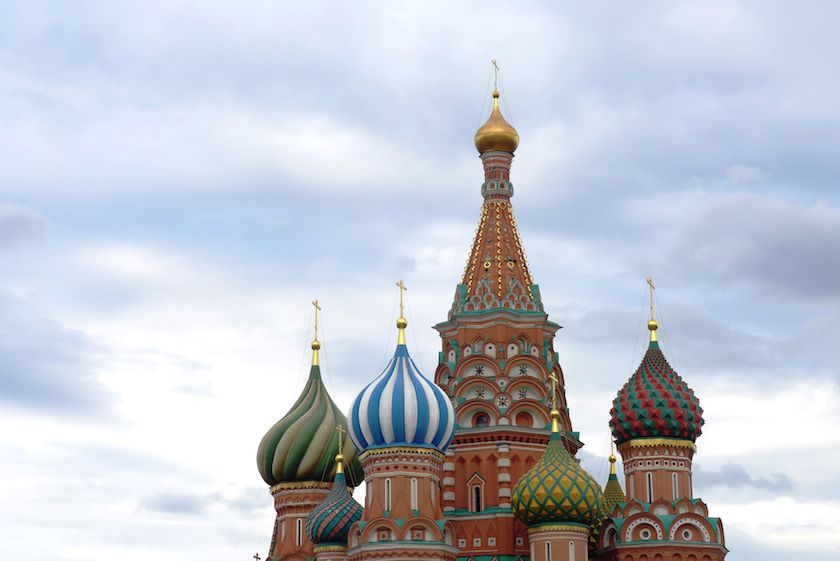Matryoshkas, Vodka, Communism. If these are your first associations with Russia, think again. The world's largest country in terms of land area has far more to offer than that. So don't let yourself be intimidated by what you hear on the news. Don't fear the language barrier. Here's what you need to know when you think about travelling Russia for the first time.
First things first: Russia is HUGE. It borders on Finland and Norway in the northwest as well as on China and Mongolia in the southeast (and tons of other countries in between). Parts of the Atlantic, Pacific and the Arctic Ocean wash upon its shores. You can find subtropical beaches in Sochi, active volcanos on the peninsula of Kamchatka and of course severe winters in areas close to the polar circle.
With that in mind, you first have to make a decision about where you want to go, and also: when. While temperatures really do drop low in the winter months, those surreal below zero numbers are mostly only reached in Siberia - where you can also experience scorching hot summers. Hello, continental climate!
Everything I write about here can only refer to the measly 1000 or so kilometers that I covered in the west of Russia. Looking on a map, it may seem like Saint Petersburg, Moscow and the European borders are only a stone's throw away from each other. But don't let Russia's dimensions fool you - Saint Petersburg is nearly as far from Moscow as Venice is from Berlin.
Sorry to disappoint you, dear travelettes: a spontaneous weekend trip to Russia is difficult to impossible. Even for comparatively short trips, a visa is compulsory. You can either try to go through the application process alone (which is slighty more time-consuming) or authorise an agency to take care of it for you (which, of course, is slighty more expensive).
In any case, you will need:
To fill out and hand in a Russian Consulate form that is not as scary as it looks Your passport, valid for at least another six months and two blank pages left A passport-size biometric photograph of you A rough plan of where you will go and when you will be there - ideally with so called „tourist invitations" which are issued by hotels and hostels, confirming that you are indeed staying with them
I'm German and I also had to hand in a document proving that my travel insurance covers my stay in Russia. To save yourself some stress, I would recommend to start taking care of the visa at least one month before leaving. It is possible to speed up the process at the consulate - this will cost additional fees though, which are better invested in Russian candy.
This next point may come as a shock, but there you have it: In Russia, people talk, read and write in Russian. For all us non-Russians, that means: get comfortable with the Cyrillic alphabet. It has 33 letters, some of which correspond to the latin script we are used to - and some others to confuse you when you are trying to read something in a hurry.
Even with no vocabulary at all, just being able to read will get you incredibly far. In Moscow, not even the metro stations have latin lettering! Additionally, you will stumble upon signs saying words like "post", "restaurant" and "tualet" - no language genius needed for that! So print out a handy little alphabet overview and prepare for some seriously funny (and also slightly embarrassing) moments, when you try to read the words "muffin", "kofe" and "marshmelloy" in front of your travel companion and the staff of a Russian coffee house. Letter by letter. And almost as fast a second grader!
Public transport in general is pretty good - especially when it comes to the metropolitan areas. The metro is cheap and most stations are amazingly beautiful. Speaking of transregional travelling, there are routes that are covered by modern high-speed trains which will not be any different from European speedtrains, expect that someone brings you black tea. It is more fun though (and also cheaper and more time-effective) to use a night train, if it suits your plans. We traveled from the historic city of Yaroslavl to Saint Petersburg over night - and I really liked this 14-hour experience, complete with Russian Babushkas, picnics in our compartment, a samowar and a surprisingly good night's sleep.
Let's cut to the chase: some regions of Russia are dangerous right now. There are several foreign offices advising against going to certain areas, mostly near the borders of Georgia, Azerbaijan and - obviously - Ukraine.
But even assuming that you will only be travelling elsewhere, you will still notice that there are a lot of security measures. You will encounter security gates and metal detectors at almost every bigger railway station. You will see lots of guards in various uniforms patrolling the streets, tourist attractions and some stores. The police men carry guns and batons - a sight you rarely see in Europe and which threw me off at first. But on the upside: no matter how stern a police man may look - they will gladly help you out if you are lost and even guide you to your destination if it is closeby.
An umbrella, even if you are going in the summer. You can of course also simply bring your rain coat (and I recommend to do so, too), but keep in mind that the Russian women are fashionable as hell. No matter what age, they always seem to put quite some thought into how they are presenting themselves. So while I would not recommend packing only highheels and cocktail dresses: just be aware, that your jack-wolfskin-jacket-sneaker-jeans-backpack-combo will give you away almost instantly.
Some sweets from your own country, especially if you have long train rides on your itinerary. Sweets can help you to get in contact with the people you are traveling with. And that way you will not have to feel bad accepting home-baked pastries from your fellow passengers.
Common sense: Russia is a bit more... relaxed when it comes to safety regulations in everyday live. So keep your eyes open for enormous potholes, covered haphazardly with an iron grate, watch out for hot samowars in narrow hallways and do not expect banisters on floor-to-ceiling hotel windows on the seventh floor.
A thick skin: The biggest cultural confusion happened when I tried to smile at Russians. Normally, this is a good way to compensate for not speaking the language very well, standing in the way or being a generally annoying tourist - in Russia, I rarely ever got a smile back. After I also noticed that most Russians don't seem to smile when they get their picture taken, I decided to ask a Russian friend of mine. She told me that, "in comparison to the American culture, Russians don't smile as much, because they don't want to feel like they have to. So they won't, unless they really feel like it - so you know that a Russian smile is always a true smile."
Curiosity for this beautiful country; its nature, its cities, its churches; the tasty food, the dangerous vodka, the amazing culture. See the Red Square, explore the beauty that is Saint Petersburg, let yourself be blinded by more gold and colorful frescos than you have ever seen before. Cчастли́вого !
Do you have any further advice on how to prepare for your first trip to Russia? Or any experience with unsmiling Russians as well? Let us know in the comments section!
This is a guest post by Annegret Müller. If you want to see more of Russia and follow her way back through Finland to her current homebase Leipzig, check out her Instagram @oiskipoisk.


